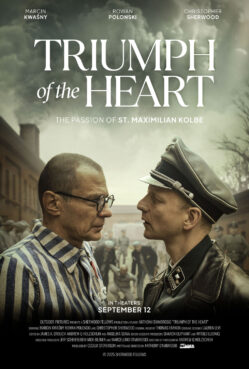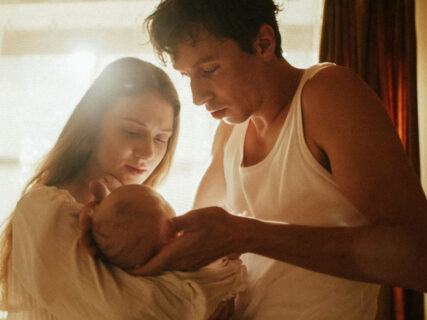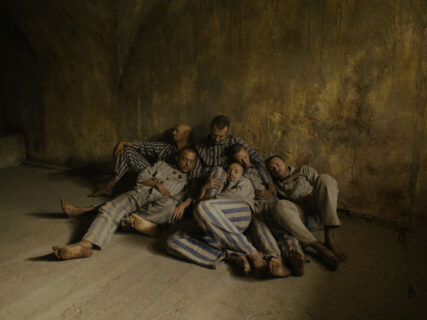VATICAN CITY (RNS) — “Triumph of the Heart,” a new film about St. Maximilian Kolbe, a Polish priest who gave his life in Auschwitz, brings cinematic heft to Catholic storytelling while confronting timeless questions of faith, sacrifice and resistance to tyranny.
The film — on view in U.S. theaters on Sept. 12 as a one-night nationwide event — focuses on the last days of Kolbe’s life in late 1941 in the Auschwitz concentration camp. Portraying historical events, after a prisoner escaped, deputy SS camp Commander Karl Fritzsch picked 10 prisoners at random to be starved to death in an underground bunker. When Kolbe heard one of the condemned, the Polish Catholic Franciszek Gajowniczek, weep for his wife and children, he offered himself instead.
“(The movie) raises the issues of hope and despair, of love and sacrifice,” said executive producer Marcellino D’Ambrosio, a Catholic author and speaker, in an interview with Religion News Service. “How can you believe in God in the midst of this hell? Those are perennial questions.
“This story will always be relevant because it hits fundamental human issues,” he added.
Fritzsch, portrayed by British actor Christopher Sherwood, allows Kolbe, played by Polish actor Marcin Kwasny, to sacrifice himself but whispers to him, “you have proved nothing.” The film sets out to prove Fritzsch wrong, showing how Kolbe’s sacrifice radiated hope amid unimaginable suffering.
Kolbe is thrown into a cell with the nine other prisoners, including a communist, two soldiers bonded by war, a Jewish science professor and his student, a Romani and gay man. The cell becomes the backdrop as the men come to terms with their imminent death.
Marcellino said Anthony D’Ambrosio, the film’s writer and director and his son, drew on his own experience of illness and despair that left him unable to eat or sleep — a kind of “starvation bunker” of his own. Those years of anguish gave the director the ability to portray Kolbe’s final days with honesty and depth.
The movie shifts from peaceful bucolic images of daily life to the horrors of the cell where the inmates are starving to death. Almost the entire movie is filmed in a 4:3 ratio, giving a sense of being caged-in as Kolbe and his fellow prisoners were.
Throughout the film, Kolbe is a steadfast yet believable witness of Christian faith, offering comfort and courage to the other inmates. He leads them to prayer and song, which in turn inspires others in the camp who can hear it to do acts of defiance against their Nazi captors. The movie reaches its climax during a scene where Kolbe hears the confessions of some of the prisoners, in a moment filled with reveals.
Although viewers might already know how Kolbe’s story ends, the film manages to keep an atmosphere of uncertainty. Marcellino said the film was made in a context of prayer and spirituality that drew in non-Catholics as well.
Kolbe was born in Poland in 1894, then under the Russian Empire. He believed he had a vision of the Virgin Mary, offering him two crowns, one white and the other red, representing, respectively, purity and martyrdom. This imagery is used in the movie to demonstrate the profound devotion Kolbe had for Mary.
He became a Franciscan and professed his final vows in 1914. After studying philosophy at the Pontifical Gregorian University in Rome, in 1918, he was ordained a priest in the throes of World War I and returned to Poland. He ran several publications aimed at spreading the gospel and rebutting communist ideology. In 1938, he started an amateur radio station.
The movie recognizes Kolbe’s knowledge of communications and the media. “You know the power of stories,” Fritzsch tells Kolbe after he inspired several prisoners at the camp through his defiance.
Between 1930 and 1936, Kolbe served as a missionary in China and later Japan and India. When World War II started, he chose to remain in the monastery outside Warsaw to run a hospital and hid almost 2,000 Jews and Poles fleeing Nazi persecution, according to Catholic accounts.
The monastery was shut down in 1941, and Kolbe was arrested by the Gestapo. He was taken to Auschwitz soon after.
While many Jews recognized and praised Kolbe’s sacrifice, some scholars have criticized him for promoting anti-Zionist rhetoric in his writings and publications that highlighted Jewish involvement with Freemasonry, which reflected antisemitic conspiracies in Poland at the time.
Debate surrounding Kolbe’s attitude toward Jews was especially fervent in the period leading up to his canonization by John Paul II on Oct. 10, 1982, when he was declared a martyr of charity, meaning someone who died as a result of an act of self-sacrifice. John Paul II called him a “patron of our difficult century,” and he is also considered the patron saint of radio operators, drug addicts and political prisoners.
“This is a universal story, and I think true sanctity is universal,” Marcellino said. “Mother Teresa was for everyone. John Paul II was for everyone. And I think Kolbe is everyone’s. This movie relates to everyone. It’s a story of humanity and hope.”
The film premiered in Warsaw, Poland and Dallas in early September, where Marcellino and other attendees said it received a standing ovation.










